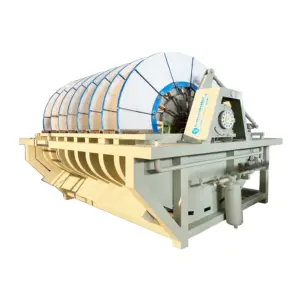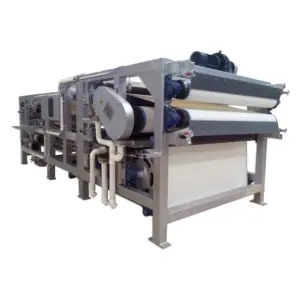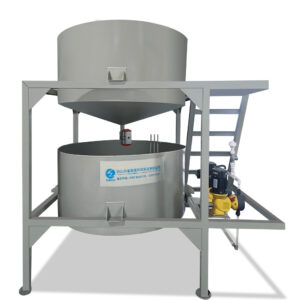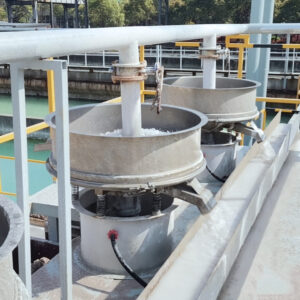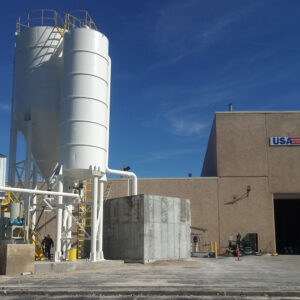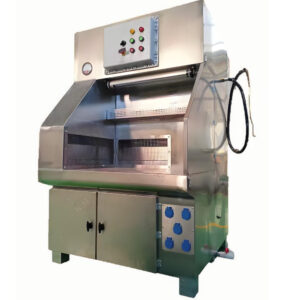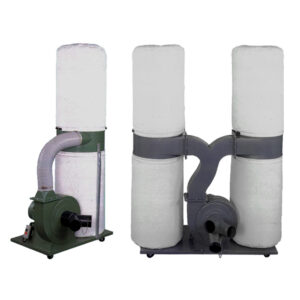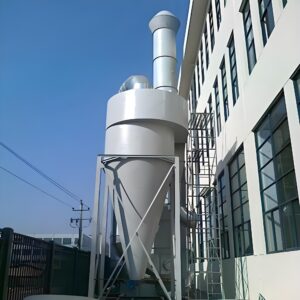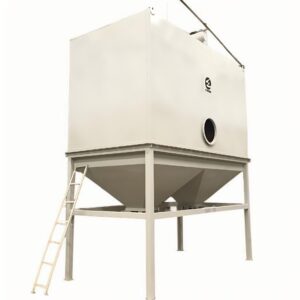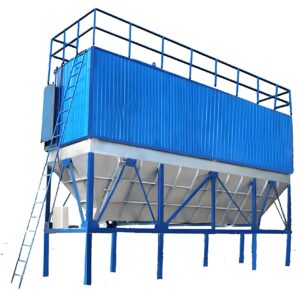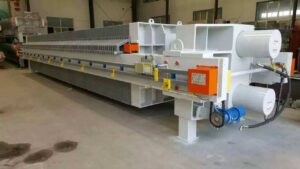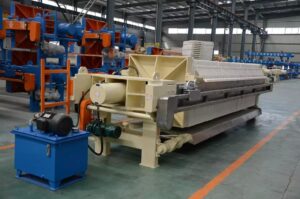Aluminum filter presses have revolutionized the filtration industry with their lightweight yet powerful performance. These innovative devices offer an efficient solution for separating solids from liquids in various industrial processes, particularly in the aluminum production and refining sectors. As we delve into the world of aluminum filter presses, we'll explore their unique advantages, applications, and the cutting-edge technology that makes them indispensable in modern filtration systems.
The aluminum filter press combines the strength and durability of traditional filter presses with the lightweight properties of aluminum, resulting in a versatile and efficient filtration solution. This article will examine the key features that set aluminum filter presses apart, their diverse applications across industries, and the technological advancements that continue to enhance their performance. We'll also discuss the economic and environmental benefits of implementing these systems in your filtration processes.
As we transition into the main content, it's important to understand that the aluminum filter press is not just a minor improvement on existing technology, but a game-changer in the field of industrial filtration. Its unique combination of strength, efficiency, and portability has made it an increasingly popular choice for businesses looking to optimize their filtration processes while reducing operational costs.
Aluminum filter presses offer up to 40% weight reduction compared to traditional steel filter presses, making them easier to transport and install without compromising on filtration efficiency.
What Makes Aluminum Filter Presses Stand Out from Traditional Options?
Aluminum filter presses have gained significant traction in the filtration industry due to their unique properties and advantages over traditional filter press materials. The lightweight nature of aluminum, combined with its strength and corrosion resistance, makes it an ideal material for constructing efficient and durable filter presses.
These innovative filter presses offer a perfect balance between performance and practicality. They provide excellent filtration capabilities while being significantly lighter than their steel counterparts, making them easier to transport, install, and maintain.
One of the key advantages of aluminum filter presses is their resistance to corrosion, which is particularly beneficial in industries dealing with aggressive chemicals or harsh environmental conditions. This corrosion resistance not only extends the lifespan of the equipment but also ensures consistent performance over time.
Studies have shown that aluminum filter presses can reduce energy consumption by up to 25% compared to traditional steel filter presses, due to their lighter weight and more efficient design.
| Feature | Aluminum Filter Press | Traditional Steel Filter Press |
|---|---|---|
| Weight | 40-50% lighter | Heavier |
| Corrosion Resistance | High | Moderate |
| Energy Efficiency | Up to 25% more efficient | Standard |
| Maintenance | Lower frequency | Higher frequency |
| Initial Cost | Higher | Lower |
| Long-term Cost | Lower due to efficiency and durability | Higher due to maintenance and energy costs |
In conclusion, aluminum filter presses offer a compelling alternative to traditional options, combining lightweight design with robust performance and long-term cost-effectiveness. Their unique properties make them particularly well-suited for industries requiring both high filtration efficiency and ease of operation.
How Does the Design of Aluminum Filter Presses Enhance Filtration Efficiency?
The design of aluminum filter presses plays a crucial role in enhancing filtration efficiency. These presses are engineered to maximize the surface area available for filtration while minimizing the overall footprint of the equipment. This efficient design allows for higher throughput and better solid-liquid separation.
PORVOO has been at the forefront of aluminum filter press design, incorporating innovative features that significantly improve filtration performance. These designs typically include recessed plates with a large filtration area, optimized flow channels, and advanced sealing mechanisms to prevent leakage.
The lightweight nature of aluminum allows for the creation of larger plates without the excessive weight associated with steel plates. This means that aluminum filter presses can often handle larger volumes of slurry with fewer plates, leading to more efficient operation and easier maintenance.
Advanced aluminum filter press designs can achieve filtration efficiencies of up to 99%, significantly outperforming many traditional filtration methods.
| Design Feature | Benefit |
|---|---|
| Recessed Plates | Increased filtration area |
| Optimized Flow Channels | Improved slurry distribution |
| Advanced Sealing | Reduced leakage and contamination |
| Larger Plates | Higher throughput with fewer components |
| Lightweight Construction | Easier handling and maintenance |
In conclusion, the thoughtful design of aluminum filter presses contributes significantly to their enhanced filtration efficiency. By maximizing filtration area, optimizing flow, and leveraging the unique properties of aluminum, these presses offer superior performance in a compact and user-friendly package.
What Industries Benefit Most from Aluminum Filter Press Technology?
Aluminum filter press technology has found applications across a wide range of industries, each benefiting from its unique combination of lightweight construction and robust filtration capabilities. While the technology is versatile, certain sectors have seen particularly significant advantages from its implementation.
The chemical industry, for instance, has embraced aluminum filter presses due to their corrosion resistance and ability to handle aggressive substances. In the food and beverage sector, these presses have proven invaluable for their ability to maintain high hygiene standards while efficiently separating solids from liquids in various processes.
Perhaps unsurprisingly, the aluminum production industry itself has been one of the biggest beneficiaries of this technology. Aluminum Filter Press systems are crucial in the refining process, helping to separate aluminum hydroxide from the sodium aluminate solution in the Bayer process.
In the aluminum production industry, the use of aluminum filter presses has been shown to increase productivity by up to 30% while reducing waste by up to 25%.
| Industry | Primary Benefits |
|---|---|
| Chemical | Corrosion resistance, chemical compatibility |
| Food & Beverage | Hygiene, efficiency in solid-liquid separation |
| Aluminum Production | High throughput, reduced waste |
| Wastewater Treatment | Large volume handling, high filtration efficiency |
| Mining | Durability, ability to handle abrasive materials |
| Pharmaceuticals | Precision filtration, ease of cleaning |
In conclusion, while aluminum filter press technology offers benefits across many industries, it has proven particularly valuable in sectors dealing with corrosive substances, requiring high hygiene standards, or processing large volumes of material. The versatility and efficiency of these presses make them a smart choice for a wide range of industrial applications.
How Do Aluminum Filter Presses Contribute to Sustainable Manufacturing Practices?
Aluminum filter presses play a significant role in promoting sustainable manufacturing practices across various industries. Their design and operational characteristics contribute to reduced energy consumption, improved resource efficiency, and minimized waste generation, aligning well with the principles of sustainable production.
One of the primary ways aluminum filter presses contribute to sustainability is through their energy efficiency. The lightweight nature of aluminum means these presses require less energy to operate compared to their heavier counterparts. This translates to lower power consumption and reduced carbon emissions over the lifetime of the equipment.
Moreover, the high filtration efficiency of aluminum filter presses leads to better resource utilization. By effectively separating solids from liquids, these presses enable the recovery and reuse of valuable materials that might otherwise be lost in the waste stream. This not only reduces raw material consumption but also minimizes the volume of waste requiring disposal.
Implementation of aluminum filter presses in manufacturing processes has been shown to reduce wastewater volume by up to 80%, significantly decreasing the environmental impact of industrial operations.
| Sustainability Aspect | Impact of Aluminum Filter Presses |
|---|---|
| Energy Consumption | Reduced by up to 25% |
| Waste Reduction | Up to 80% decrease in wastewater volume |
| Resource Recovery | Improved separation and reuse of materials |
| Equipment Lifespan | Extended due to corrosion resistance |
| Transportation Emissions | Lowered due to lighter weight |
| Water Usage | Decreased through efficient filtration and recycling |
In conclusion, aluminum filter presses make a substantial contribution to sustainable manufacturing practices. By reducing energy consumption, minimizing waste, and improving resource efficiency, these presses help industries lower their environmental footprint while often improving their operational efficiency and cost-effectiveness.
What Maintenance Considerations are Unique to Aluminum Filter Presses?
Maintaining aluminum filter presses requires specific considerations due to their unique material properties and design features. While these presses generally require less maintenance than their steel counterparts, understanding their particular needs is crucial for ensuring optimal performance and longevity.
One of the primary maintenance considerations for aluminum filter presses is the prevention of galvanic corrosion. This can occur when aluminum comes into contact with dissimilar metals in the presence of an electrolyte. Proper insulation and the use of compatible materials in the press construction are essential to prevent this issue.
Regular cleaning is another crucial aspect of aluminum filter press maintenance. While aluminum is naturally resistant to many forms of corrosion, it can still be affected by certain chemicals and substances. Using appropriate cleaning agents and methods is important to preserve the integrity of the aluminum components.
Proper maintenance of aluminum filter presses can extend their operational lifespan by up to 50% compared to poorly maintained units, resulting in significant long-term cost savings.
| Maintenance Aspect | Consideration for Aluminum Filter Presses |
|---|---|
| Galvanic Corrosion Prevention | Use of insulation and compatible materials |
| Cleaning | Selection of appropriate cleaning agents |
| Plate Inspection | Regular checks for wear and deformation |
| Seal Replacement | Use of compatible gasket materials |
| Lubrication | Application of food-grade lubricants where necessary |
| Surface Treatment | Periodic reapplication of protective coatings |
In conclusion, while aluminum filter presses generally require less maintenance than traditional options, they do have unique considerations. Addressing these specific needs, such as preventing galvanic corrosion and using appropriate cleaning methods, is key to maximizing the lifespan and performance of these innovative filtration systems.
How Does the Cost-Benefit Analysis of Aluminum Filter Presses Compare to Traditional Options?
When considering the implementation of aluminum filter presses, it's crucial to conduct a thorough cost-benefit analysis comparing them to traditional filtration options. While the initial investment for aluminum filter presses may be higher, the long-term benefits often outweigh the upfront costs.
The primary advantage in the cost-benefit analysis comes from the operational efficiencies of aluminum filter presses. Their lightweight nature contributes to lower energy consumption, which translates to reduced operating costs over time. Additionally, the corrosion resistance of aluminum typically results in lower maintenance expenses and a longer operational lifespan.
Another factor to consider is the increased productivity that aluminum filter presses can offer. Their efficient design often allows for higher throughput and faster cycle times, potentially increasing overall production capacity without the need for additional equipment or space.
Studies have shown that despite a 15-20% higher initial investment, aluminum filter presses can provide a return on investment up to 30% faster than traditional steel filter presses due to lower operating costs and increased productivity.
| Factor | Aluminum Filter Press | Traditional Steel Filter Press |
|---|---|---|
| Initial Cost | Higher | Lower |
| Energy Consumption | Lower | Higher |
| Maintenance Costs | Lower | Higher |
| Operational Lifespan | Longer | Shorter |
| Productivity | Higher | Lower |
| Space Efficiency | Better | Standard |
| Return on Investment | Faster | Slower |
In conclusion, while aluminum filter presses may require a higher initial investment, their long-term cost benefits are significant. Lower operating costs, reduced maintenance expenses, increased productivity, and a longer lifespan all contribute to a favorable cost-benefit analysis when compared to traditional filtration options.
What Future Developments Can We Expect in Aluminum Filter Press Technology?
The field of aluminum filter press technology is continuously evolving, with ongoing research and development aimed at enhancing performance, efficiency, and sustainability. As we look to the future, several exciting developments are on the horizon that promise to further revolutionize this technology.
One area of focus is the integration of smart technologies and automation. Future aluminum filter presses are likely to incorporate advanced sensors and control systems that can optimize filtration parameters in real-time, leading to improved efficiency and reduced downtime. This could include features like predictive maintenance alerts and automatic adjustments based on slurry characteristics.
Another promising direction is the development of new aluminum alloys specifically engineered for filtration applications. These advanced materials could offer even better corrosion resistance, strength, and lightweight properties, further enhancing the benefits of aluminum filter presses.
Industry experts predict that next-generation aluminum filter presses could achieve up to 50% higher filtration rates while reducing energy consumption by an additional 20% compared to current models.
| Future Development | Expected Impact |
|---|---|
| Smart Technology Integration | Improved efficiency and reduced downtime |
| Advanced Aluminum Alloys | Enhanced performance and durability |
| Nanomaterial Filter Media | Higher filtration rates and precision |
| Modular Design Improvements | Increased flexibility and easier upgrades |
| Sustainable Manufacturing Processes | Lower environmental impact of press production |
| Energy Recovery Systems | Further reduction in operational costs |
In conclusion, the future of aluminum filter press technology looks bright, with developments in smart technology, materials science, and sustainable design promising to deliver even more efficient, productive, and environmentally friendly filtration solutions. These advancements will likely cement the position of aluminum filter presses as a cornerstone technology in industrial filtration processes.
Conclusion
Aluminum filter presses represent a significant leap forward in filtration technology, offering a compelling combination of lightweight design, robust performance, and long-term cost-effectiveness. Throughout this article, we've explored the unique advantages of these innovative systems, from their enhanced filtration efficiency to their contributions to sustainable manufacturing practices.
We've seen how the design of aluminum filter presses maximizes filtration area while minimizing equipment footprint, leading to higher throughput and better solid-liquid separation. The technology has found applications across a wide range of industries, with particular benefits in sectors dealing with corrosive substances or requiring high hygiene standards.
The sustainability aspects of aluminum filter presses are particularly noteworthy. By reducing energy consumption, minimizing waste, and improving resource efficiency, these presses help industries lower their environmental footprint while often improving operational efficiency and cost-effectiveness.
While aluminum filter presses do require specific maintenance considerations, proper care can significantly extend their operational lifespan, resulting in long-term cost savings. The cost-benefit analysis overwhelmingly favors aluminum filter presses when compared to traditional options, especially when considering factors like energy consumption, maintenance costs, and productivity improvements.
Looking to the future, ongoing developments in smart technologies, advanced materials, and sustainable design promise to further enhance the capabilities of aluminum filter presses. These advancements are likely to solidify their position as a key technology in industrial filtration processes.
In conclusion, aluminum filter presses offer a powerful, efficient, and sustainable solution for industrial filtration needs. As industries continue to seek ways to optimize their processes and reduce their environmental impact, the adoption of aluminum filter press technology is likely to accelerate, driving further innovations in this exciting field.
External Resources
Filter Press for Metal Refinery – This resource discusses the use of filter presses in metal refinery plants, including the filtration of residues from extraction processes and the purification of solutions. It highlights the need for specialized filter presses that can operate in acidic and high-temperature conditions.
EA Series Filter Presses – This page describes the EA Series Recessed Chamber Filter Presses, which are used for dewatering, mash filtration, and dewaxing. It mentions the use of chemically resistant materials and gasketed polypropylene plates, which could be relevant for aluminum processing.
EP Filter Press – This resource details the EP Filter Press, an economical choice for small to medium-size dewatering applications. It includes options for manual and automatic versions, which might be suitable for various industrial processes, including those involving aluminum.
The Application of Filter Presses in the Mining Industry – Although focused on the mining industry, this article discusses the use of automatic filter presses for dewatering products, removing impurities, and improving overall efficiency. The principles can be applied to other industries, including aluminum processing.
Aluminum Hydroxide Filter Press – This link is to a page that specifically addresses the use of filter presses in the filtration of aluminum hydroxide, a common process in aluminum production. It highlights the importance of efficient dewatering and cake handling.
Filter Presses for Industrial Applications – M.W. Watermark offers filter presses for various industrial applications, including those that might involve aluminum. Their filter presses are designed for efficient dewatering and can be customized for different processes.
Aluminum Refinery Filter Press Solutions – Outotec provides filter press solutions for various industrial applications, including metal refineries. Their filter presses are designed to handle challenging conditions and can be adapted for aluminum refinery processes.
Custom Filter Press Solutions – BHS-Sonthofen offers custom filter press solutions that can be tailored to specific industrial needs, including those in the aluminum industry. Their filter presses are known for their efficiency and durability in various applications.
